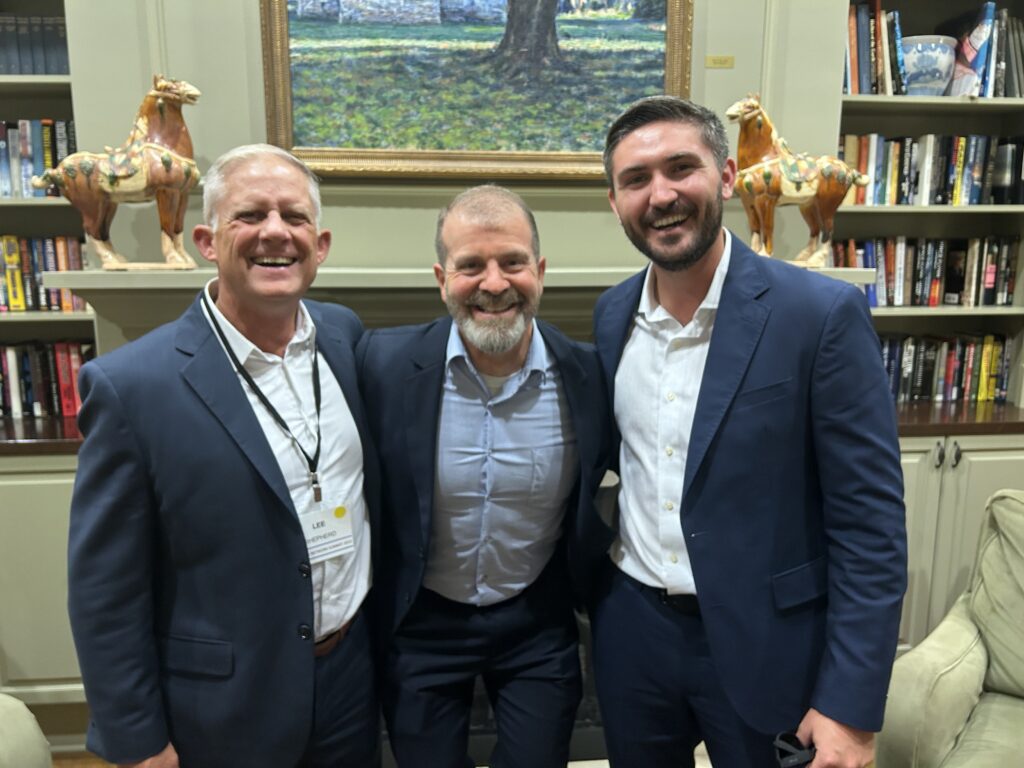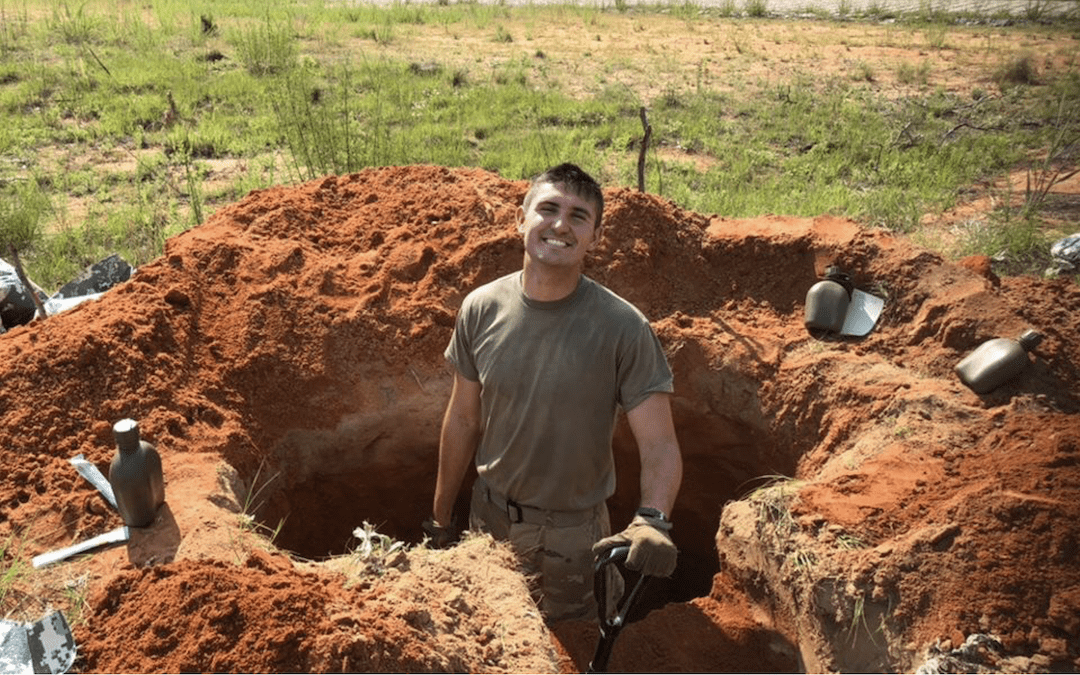GE Aerospace's Quick Six With Military Veteran Brendan Costello
November 6, 2023 | by Lauren Devoy
From working parents to military veterans, GE Aerospace would not be the company it is today without its employees. We created “Quick Six” to celebrate our diverse talent by asking employees six questions that uncover the unique ways that they contribute to GE and the world.
In this installation of Quick Six, GE Aerospace chatted with Brendan Costello, who is in the Military Officer Leadership Program.
Costello was an Infantry Officer in the United States Army, who served for four years at Fort Moore, GA and Fort Johnson, LA. Most of his family on his father’s side served in the military, so it was a natural step for him to serve. Costello is now approaching two years at GE and in his final rotation in the Military Officer Leadership Program. He also recently co-led the Veterans Summit Planning Team.
What made you decide to join GE Aerospace?
I studied industrial engineering at Purdue University, which hosts one of the largest career fairs in the country. GE recruited heavily and left an impression on me, even though I knew I was going to serve in the military. After the military, I was looking for my next challenge. I was specifically looking for a program in the civilian world that gave the opportunity to learn with a rotational aspect to it, and the GE Military Officer Leadership Program (MOLP) stood out for me.
 Above: Costello, on right, at the Veteran's Summit earlier this year with Lee Shepherd, left, Executive Product Manager of Electrical Power, and Mark Gillespie, Senior Program Manager for Electrical Power. All three are members of GE's Veteran's Network. Top: Costello during an Infantry Basic Officer Leadership Course at Fort Moore, GA. Costello was digging the hole during Defensive Operations.
Above: Costello, on right, at the Veteran's Summit earlier this year with Lee Shepherd, left, Executive Product Manager of Electrical Power, and Mark Gillespie, Senior Program Manager for Electrical Power. All three are members of GE's Veteran's Network. Top: Costello during an Infantry Basic Officer Leadership Course at Fort Moore, GA. Costello was digging the hole during Defensive Operations.
For those who don’t know, what is the Veteran’s Network?
It is an Employee Resource Group comprised of veterans and veteran advocates. Everyone has a different perception of what the Veterans Network means to them. For me, it’s the comradery — when you leave the military, you leave a team that you spend more time with than your own family. Being with people who understand who you are, share similar experiences, and know what you’re capable of just by the fact you have been in the military is comforting.
Secondly, the career growth piece is huge for me. The Veteran’s Network is all about lifting each other up. It is the complete opposite to a cutthroat environment. You want people around you to succeed. You can really feel this in the Vets network.
Finally, I really appreciate the giving back and the community service piece. Bridging skills and helping those who are transitioning from the military is very valuable. We help by having their resumes screened and giving advice and tips for interviews.
Without a doubt you do not have to be a veteran to participate, the vast majority of members are, but there are people who are in the network with no direct connection to anyone who has served in the military. That is the power of the network and the magnet that attracts people, it’s all-inclusive.
What were your biggest challenges faced transitioning from the Army to GE Aerospace, and what has been the most unique experience at GE you’ve had thus far?
I felt prepared for my interviews through the career preparation at Purdue University. However, once I arrived at GE, finding the balance and not calling everyone ‘sir’ or ‘ma’am’ like I had in the military was a challenge, but I quickly adapted.
Learning how to lead horizontally was vital, and learning how to get what you need from people through relationship building, networking, and identifying key stakeholders that will help you is important.
In the military you can give an order and expect it to happen. If it doesn’t there are usually consequences. However, in the civilian world it is very different. It’s more about soft influencing and relationship building.
So far, one of the most unique experiences in my MOLP experience was going to the Paris Air Show. Usually, it tends to be senior leadership that attend, but I had a very supportive assignment leader. Only having been with the company approximately a year and a half, it was an incredible and exciting experience. I fully seized the opportunity and am so thankful as I learned so much.
What were the highlights of the vets summit in Jacksonville, with over 200 in attendance?
One moment that stood out for me was during Montel Williams’ (host of the Military Makeover TV show) live feed, seeing how passionate he was in helping veterans, and making recommendations to go above and beyond was amazing.
We had over a dozen internationals this year compared to a much smaller number last year. We tripled our size of international attendees, and had about 200 attendees overall. It is paramount to get advocacy from senior leadership. We now have Liam Slate, CFO as the UK advocacy leader for the veteran’s summit. It was great to have him on the panel and hear what advocacy means to him and see the talent in the room. It was really impactful. It is quite unique as Liam hasn’t served, which is great as it gives a different perspective and I really appreciate that.
What advice would you offer to any potential MOLP or service leader thinking of coming to GE?
I cannot say enough good things for what GE does to value Military service. They are going to take you and give you responsibility right away. As you move through your rotations more and more responsibility is given. There are few programs that you can come out of the military and compete in the job market against people with years of experience in role and be given serious opportunities. At the same time you are allowed to learn, make mistakes and there are people around to support you. So, you are not just out there alone. The rotational piece is great as well. As an infantry officer I had great leadership communication skills, the ability to think through problems, and the skill to not react when put under stress. You get to put those skills to the test with three different perspectives at three different parts of the business, in my case, and there is so much value in that.
Jim Rauco, Veteran’s Network member and production supervision specialist at Unison, a GE Aerospace company, said something very powerful after winning an award for his dedication to the network. He said that the Veteran’s Network supports those who have chosen to put themselves into harm’s way. How do you feel about that?
There is a saying of ‘signing the dotted line.’ When you join the military, you sign a contract and agree that you could be called to do things you don’t want to do and you could pay the ultimate sacrifice with your life. Our nation does a great job of supporting veterans but can always be better.
There is a lot of power in deciding to do something for the betterment of the country, society, safety of families. One of our guest speakers, Admiral Daniel Fillion, when thanked for his service said, “Your family was worth it.” I think that sums it up perfectly.





